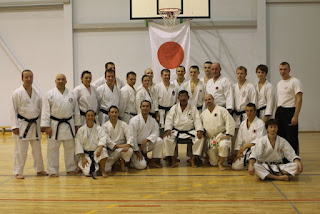Karate in Latvia
For any karateka wishing to enrich their training they should take the trouble to visit Latvia. There are a number of dojo's in Riga, although the main attraction for my visit was Shihan Kato, 9th Dan IJKA, hosted and organised very well by Boris Krasnov.
Many others travelled great distances, with a large contingency of senior Sensie's from Lithuania. If you have never trained with Kato you will soon realise that his teaching can bring you great insights if you can watch and listen carefully. I have been fortunate to train with him on many occasions and even so, I never know what we will be doing next. No lesson is ever the same.
Of course, the karate is founded on the teachings of great masters, including Nakayama, Kanazawa and Asai, but what we are taught is not a karate that is cast in stone. It seems to me it is forever changing with explorations here and there, to see if the techniques can be made more effective and great thought put into analysing body mechanics and the finer points in kata and the bukai. You could say it is the thinking man's karate, but analysis to develop great speed and power. And then practice, practice, practice.
The course was over 2 days with 5 hours training each day, but it is not all physical; much of it is mental training. Most of the kihon, kumite and kata was a new experience so everyone had to really concentrate. A good example was the practice of Kanku Dai. Of course, every senior knows this kata and most will have practiced it 100's of times, but there is always something new to learn. A number of corrections were made to many of the finer details in the kata, which made perfect sense when the applications were demonstrated.The bunkai we practised was both elegant and practical.What you might 1st interpret to be a block is often a strike(or both), what you might 1st consider a technique to be a defence or attack in one direction is actually from another direction. The possibilities seem endless.
One aspect of the training that may surprise those unfamiliar with Kato is that although he strives for excellence and demands a lot from his students, they do not need to be gifted with great physical attributes. Children are encouraged and we practised a kata for the disabled and wheelchair users. As long as you try your best and he can see an improvement then Kato will be happy.
Thank you to all of those who made me welcome, being good training partners and sending me home with inspiration.
Michael Barr 4th Dan IJKA
http://www.youtube.com/watch?v=KmC0V5LO9CM
Many others travelled great distances, with a large contingency of senior Sensie's from Lithuania. If you have never trained with Kato you will soon realise that his teaching can bring you great insights if you can watch and listen carefully. I have been fortunate to train with him on many occasions and even so, I never know what we will be doing next. No lesson is ever the same.
Of course, the karate is founded on the teachings of great masters, including Nakayama, Kanazawa and Asai, but what we are taught is not a karate that is cast in stone. It seems to me it is forever changing with explorations here and there, to see if the techniques can be made more effective and great thought put into analysing body mechanics and the finer points in kata and the bukai. You could say it is the thinking man's karate, but analysis to develop great speed and power. And then practice, practice, practice.
The course was over 2 days with 5 hours training each day, but it is not all physical; much of it is mental training. Most of the kihon, kumite and kata was a new experience so everyone had to really concentrate. A good example was the practice of Kanku Dai. Of course, every senior knows this kata and most will have practiced it 100's of times, but there is always something new to learn. A number of corrections were made to many of the finer details in the kata, which made perfect sense when the applications were demonstrated.The bunkai we practised was both elegant and practical.What you might 1st interpret to be a block is often a strike(or both), what you might 1st consider a technique to be a defence or attack in one direction is actually from another direction. The possibilities seem endless.
One aspect of the training that may surprise those unfamiliar with Kato is that although he strives for excellence and demands a lot from his students, they do not need to be gifted with great physical attributes. Children are encouraged and we practised a kata for the disabled and wheelchair users. As long as you try your best and he can see an improvement then Kato will be happy.
Thank you to all of those who made me welcome, being good training partners and sending me home with inspiration.
Michael Barr 4th Dan IJKA
http://www.youtube.com/watch?v=KmC0V5LO9CM




Comments
Post a Comment